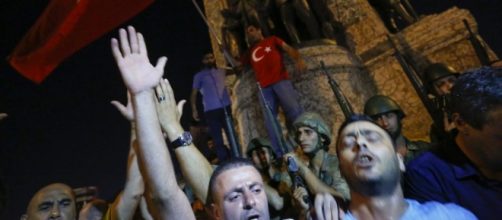On the evening of Friday 15th July, reports of soldiers on the streets, military planes flying low and tanks blocking bridges over the Bosphorus Straits emerged from Turkey. Soon after this, on national television, a faction of the Turkish military declared that a ‘peace council’ was now ruling the country, and that those involved in this apparent ‘coup’ were doing so in order to restore democracy and constitution order to their country. However, the ‘coup’ was suppressed and overcome relatively quickly by a combination of pro-government forces, police officers and civilians, and by Saturday 16th July, Recep Tayyip Erdoğan, President of Turkey and founder of the Justice and Development Party (AKP), announced that the government was control of the state.
World leaders, including Barack Obama, Theresa May and President of the European Council Donald Tusk have spoken out in their support of Turkey’s ‘democratically elected government’. However, despite this apparent victory for democracy, it is highly possible that the ‘coup’ will act as a catalyst for Erdogan’s government to further erode democracy in the Turkish state.
The road to democracy?
Since assuming office in August 2014, President Erdogan has been criticised numerous times for his authoritarian tendencies. He has reduced significantly the power of the Turkish military, a highly secular institution which has previously intervened to defend against perceived threats to Turkish secularism, a principle upon which Mustafa Kemal Atatürk, an army officer, founded the Turkish Republic in the early twentieth century.
President Erdogan’s Islamist-rooted ideology therefore contrasts greatly with the military’s unwavering secular stance. Further to this, over recent years he has cracked down on government opposition, imprisoning critics and reporters, closing anti-government outlets such as the newspaper Zaman, forcing other news outlets to publish pro-regime propaganda. In March 2016, after the bombing of Ankara, the capital of Turkey, Erdogan stated that there was no difference between ‘a terrorist holding a gun or a bomb and those who use their position and a pen to serve the aims [of terrorists]’, as he extended the legal definition of ‘terrorists’ to include MP’s, activists and journalists. Legislation has also been passed depriving parliamentary deputies of immunity from prosecution, allowing Erdogan to prosecute opposition politicians.
Indeed, according to the Economist, early in his career Erdogan compared democracy to a train; he stated that you get off when you have reached your destination.
The power of the people
President Erdogan has indirectly accused US-based ceric Fethullah Gulen of inciting the coup, attributing the events to ‘parallel structures’ seeking to topple the government. However, this is questionable, as he is essentially saying that a secular military has carried out the bidding of a prominent religious figure. In the aftermath of the coup, Erdogan has begun a purge of the Turkish judiciary, dismissing 2,745 judges and arresting 10 members of the Council of State, the country’s highest administrative court.
Indeed, in a statement he announced, ‘This uprising is a gift from God to us because this will be a reason to cleanse our army’, hundreds of whom have already been arrested by pro-government forces. There have also been talks of the death penalty being reinstated for the perpetrators of the attempted coup. On the evening of Friday 15th July, President Erdogan urged the Turkish people to take to the streets to oppose the uprising; they did just this, showing undeniably the potential power of the people, something which may worry the President in the long-term, potentially leading to further crackdowns on freedom and civil liberties.
This failed coup appeared to stand for the restoration of Turkish democracy. But one thing is for sure; regardless of whether this is seen as a success or failure by the government, it will be a severe blow to this democracy.

